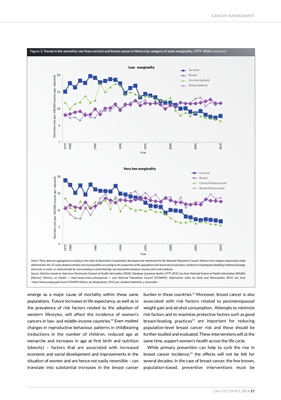
CANCER MANAGEMENT
58 CANCER CONTROL 2014
combined with early detection and treatment to mount an
effective response to a cancer that is rapidly becoming a
leading cause of death in low- and middle-income countries.
Resource stratified guidelines have been developed for
breast cancer that offer alternatives for countries to make
evidence-based decisions in setting priorities and these need
to be applied and integrated into programmes for women´s
health.44 Indeed, if countries ignore the emerging challenge of
breast cancer because it is not associated with a quick,
preventive fix, we are likely to see the emergence of a gaping
cancer divide. If early detection and access to effective
treatment are denied to poor women, mortality will decline
only among the rich countries and the wealthy, while
continuing to increase among poor women.
For both cervical and breast cancer, there are important
opportunities to apply a diagonal approach that will
strengthen health systems and improve women's health and
cancer care and control simultaneously.
5,18,41 This involves
integrating key interventions on women´s cancers such as
education and early detection, into maternal health, sexual
and reproductive health and anti-poverty programmes that
focus on women. It also requires promoting policy dialogue,
research and international action that cut across false
boundaries and silos such as those that have separated
women on women's health with that on NCDs.45
Integrated approaches will help to meet the many facets of
women's cancers that are related to motherhood, sexuality,
menopause, and to face the barriers associated broader
issues of discrimination against women. These actions can
and should be effectively catalyzed through national and
global strategies to curb not only the tide but also the swell of
women's cancers as part of the larger, emerging challenge of
chronic and non-communicable disease. l
Dr Felicia Marie Knaul is Associate Professor at Harvard
Medical School and Director of the Harvard Global Equity
Initiative. Dr Knaul is also Senior Economist at the Mexican
Health Foundation (FUNSALUD), Honorary Research Professor
of Medical Sciences at the National Institute of Public Health of
Mexico, and founder of Cáncer de Mama: Tómatelo a Pecho.
Afsan Bhadelia is a Research Associate at the Harvard Global
Equity Initiative, where she previously served as Research
Director. Concurrently, she is a doctoral candidate in the health
systems program at the Johns Hopkins Bloomberg School of
Public Health. Her research interests include promoting health
equity through chronic care management, women's health and
palliative care.
Hector Arreola-Ornelas is Economic Research Coordinator of
the Health Competitiveness Program in the Mexican Health
Foundation (FUNSALUD). He is also the Coordinator of the
Health Observatory for Latin America. His areas of research
include financial protection, policy and health systems, labour
economics, economic evaluation and health and competitiveness.
Dr Isabel dos-Santos-Silva is Professor of Epidemiology in the
Department of Epidemiology and Population Health at the
London School of Hygiene & Tropical Medicine. Her research
focuses on the causes of cancer as a basis for the development of
appropriate prevention and control strategies, both in high and
low resource settings.
Dr Danielle Rodin is a Resident in the Department of Radiation
Oncology at the University of Toronto and an MPH Candidate at
the Harvard School of Public Health. Her current research
interests are in the area of health equity in the treatment and
palliation of cancer and in the role of radiotherapy.
Dr Rifat Atun is Professor of Global Health Systems and Director
of the Global Health Systems Cluster at the Harvard School of
Public Health. He previously led the Health Management Group
at Imperial College London and was a member of the executive
management team at The Global Fund to Fight AIDS,
Tuberculosis and Malaria.
Dr Ana Langer is Professor of the Practice of Public Health and
Director of the Dean's Special Initiative in Women and Health at
the Harvard School of Public Health. Dr Langer is a reproductive
health expert. She was previously the president and CEO of
EngenderHealth.
Dr Julio Frenk is Dean of the Faculty at the Harvard School of
Public Health and T & G Angelopoulos Professor of Public
Health and International Development, a joint appointment
with the Harvard Kennedy School of Government. Dr Frenk is an
eminent authority on global health who served as the Minister
of Health of Mexico from 2000 to 2006.